Social Sciences and Humanities Research Council
The Joseph-Armand Bombardier Canada Graduate Scholarship administered by the SSHRC seeks to develop research skills and assist in the training of highly-qualified personnel by supporting students in the social sciences and humanities who demonstrate a high standard of achievement in undergraduate and early graduate studies. The Social Sciences and Humanities Research Council (SSHRC) is the federal research funding agency that promotes and supports postsecondary-based research and training in the humanities and social sciences with the goal of training Canada's researchers and leaders of tomorrow. The award amount is $17,500.
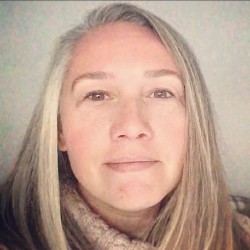 Lauren Lambert – Cultural Studies Alumna
Lauren Lambert – Cultural Studies Alumna
By receiving an SHHRC award, I feel like my credibility within the academic world is immediately recognized. So many individuals within academics have gone through the process of applying for SHHRC at one time or another, and so it provides a bridge of understanding among colleagues. My advice for future scholars is “always apply”, even if you don’t think you stand a chance or have a fully developed idea. Going through the process of applying will provide you with valuable experience that will be transferable throughout your career. Lastly, when looking for a career as you transition out of your studies, look at places that have ties to SHHRC because you’ll find like-minded people who are interested in your success as well.
2020-21 Award Recipients
Breanna Belisle – Criminal Justice
I am both humbled and honoured to win a SSHRC Mastership award! My research looks to whether there is a sentencing discount among second degree murder victims on the basis of gender and race. I will further consider whether there is a “domestic discount”, whereby domestic violence murder assailants receive less punitive sentences as result of the stereotypical construction of domestic violence victims. This research is important to me as it is essential that all are seen as equal within the justice system. Different allocations of worthiness on the basis of such social factors does not allow for an accessible justice system for all. When complete, I am for this research to have enough of an impact to require policy changes to account for potential bias in sentencing. I also aim for criminal justice practitioners to review this research and be able to assess their own bias when they conduct their duties. On a final note, winning this award in many ways validates the importance of symbolism in sentencing, ensuring that all victims are seen as equal by the justice system.
 Diana Cowley – Indigenous Governance
Diana Cowley – Indigenous Governance
Through this research, I will be working on developing a treaty-based bio-cultural heritage management protocol in my community, Naotkamegwanning Nation using the Anishinaabe Sacred Earth Law, Manito Aki Inakonigaawin. This research will understand the correlation of how Anishinaabe ancestral laws cocreated with Naotkamegwanning Nation’s bio-cultural heritage in managing their lands, can enhance minopitmatisiiwin (living the good life) using purely Anishinaabe ontological and epistemological perspectives as it relates to environmental governance. Anishinaabe Sacred Earth Law, Manito Aki Inakonigaawin will be the focus of this proposed case study as it will guide the research and understanding in connection with Anishinaabe cultural heritage and the diverse forms of life in Naotkamegwanning.
I am working with the Chair of the Masters of Indigenous Governance Program, Dr. Gabriel Nemoga. It has truly been an honour to have Dr. Nemoga as my advisor and supervisor to guide me in this exciting research journey.
Naotkamegwanning’s perspective to biodiversity conservation in relation to Manito Aki Inakonigaawin and its associated knowledges is needed to develop Canada’s internal scientific research competence to govern resources that protects Indigenous rights efficiently. Western science sets the standards for policy regarding resource management in Canada. This research will provide a practical way to demonstrate the validity of Indigenous law and knowledges in environmental governance where western science can comprehend it. In this format, the political process may be used to ensure Indigenous law and knowledges are respected and is incorporated into resource management designs. This will reinvent research agendas to combine Indigenous communities and biodiversity conservation to support ethical environmental governance moving forward in the 21st century.
Spirit has helped me move through this journey with loving action. If it wasn’t for Spirit, this would not be possible. Also, The Grand Council Treaty #3, Chief Howard Kabestra and Band Manager Laura Kakeeway of Naotkamegwanning Nation, Medicine Man Misquanaquat and my amazingly supportive family. The Masters of Indigenous Governance Program made my research possible. A huge thank you to, Chair of MAIG, Dr. Gabriel Nemoga who has been a remarkable supervisor and advisor, Dr. Shailesh Shukla’s primary research expertise and Dr. John Borrows expert knowledge and guidance with my first chapter of my thesis relating to Anishinaabe law.
I noticed the goals of this research was aligned with some of SSHRC’s challenge areas especially in the areas of shifting dynamic of privilege and marginalization, the pervasive contamination of the natural, envisioning governance systems that work and combating erosion of culture and history. I knew Manito Aki Inakonigaawin was the answer. I was thinking that I want to bring in the awareness to Canada’s consciousness, the important role that the Anishinaabe Sacred Earth Law plays with healing the Earth and its inhabitants. It was that spirit of unconditional love that the Sacred Earth Law brings that inspired me to move forward in applying for this award.
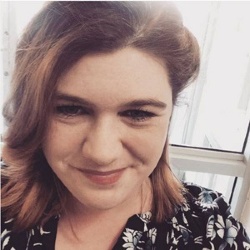 Cara Ginter – JMP History
Cara Ginter – JMP History
Cara is working toward a Master of Arts in History (JMP), where she will be analyzing the way journalists have written about missing women over the first two decades of the twentieth century.
“It is my hope that in understanding how journalists in the past have written about missing women, we can better understand reporting decisions that are made.”
She was thrilled when she heard that she had been selected for this year’s award, and looks forward to working closely with Dr. David Churchill and Dr. Len Kuffert at the University of Manitoba in her attempt to “historicise the concept of missing white women syndrome,” a term she says the late PBS anchor, Gwen Ilfill coined in 2004.
“I think that there is a lot that can be gained from understanding how the media, over time, has shaped how we see certain people, behaviours, and events,” she said.
“Receiving this SSHRC award allows me to focus on my research, as opposed to having to split my focus with a part-time job. It takes away the stress of trying to make ends meet while I’m completing my program,” she said. “Not having to worry about finding a job – especially now, mid-pandemic – means I can focus on my research and my writing.”
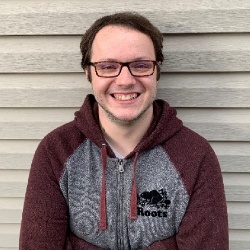 Trevor Dyck – JMP History
Trevor Dyck – JMP History
I think that receiving the SSHRC award has been an immense benefit to my research and my professional life. I was inspired to apply for this award because it would allow me to focus solely on my research during this academic year, and with COVID-19 being present it has allowed me to remain safe while working on my thesis. This award will contribute to my success because it will allow me economic freedom to focus on finishing my thesis without worry. I am currently researching the decolonization of archival records in Canada and the Caribbean and how these two processes can compare to each other. I am working on this project with Dr. Greg Bak who is supervising my work. My inspiration for this research was trying to contribute to the process of archival decolonization even in a small way. My hope is that my research can contribute to the prior work of archival decolonization and assist future researchers in this same goal. This is important to me as archival decolonization is an ongoing issue that requires ongoing research and work in order to push that goal forward. I have received help from numerous people along the way including my parents who inspire me, my best friend Alexandra Moreau who has helped me through my entire thesis, and Dr Jorge Nallim who inspired my research topic. Thank you.
 Ashley Schers – JMP History
Ashley Schers – JMP History
Under the supervision of Dr. Greg Bak at the University of Manitoba, Ashley is researching the application of the media studies theory of remediation onto the migration and digitization of archival records.
“In the past few years, maybe even the past decade, there has been a real push to digitize archival records to make them more widely available and to aid in their preservation,” she said. “However, there are dramatic variations in how records have been migrated with no universal standard for the best way to migrate and digitize these important historical records.”
She hopes her research leads to a more universally – or even nationally – accepted model for proper migration and digitization of these important records.
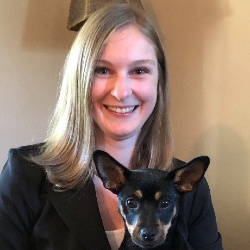 Madison Herget-Schmidt – JMP History
Madison Herget-Schmidt – JMP History
Under the supervision of Dr. Delia Gavrus in the department of history, I am going to be studying maxillofacial surgeries conducted during World War One by Canadian surgeons and how these procedures impacted the lives of soldiers and the trajectory of this surgical discipline. I was inspired to take on this project after reading an article about Frederick Coates, a sculptor who in collaboration with Canadian surgeons gave new facial features to injured soldiers. This article sparked my interest in maxillofacial surgery and researching its origins and impacts. Numerous faculty members including Dr. Alexander Freund, Dr. James Hanley, Dr. Janis Thiessen and Dr. Delia Gavrus have provided me with guidance over the years, and I am very grateful for their support. Additionally, my family have provided me with invaluable support and encouragement which is greatly appreciated. Receiving this SSHRC scholarship is a great honour, and as many of the sources that I will be using for research are located at archives in Toronto and Ottawa, this award will contribute to my continued success by making research-based travel financially feasible.
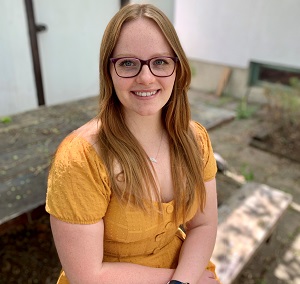 Breanna Waterman – JMP History
Breanna Waterman – JMP History
Breanna is working toward a Master of Arts in History (JMP), studying Canadian women’s responses to rationing during the Second World War, under the supervision of Dr. Janis Thiessen. Waterman was very happy when she heard her research was being funded.
“Winning this award has allowed me to focus completely on my studies and to be more involved in the academic community,” she said. Her research was inspired by a trip to an antique shop, where a selection of cookbooks from 1942 piqued her interest. “I was interested in how the recipes had changed, and what new recipes war restrictions had inspired,” she said.
She says the support she’s received from her parents, sister, grandparents, and boyfriend has been immensely helpful.
“They’ve even been willing to taste-test some of the more questionable recipes I have tried from these cookbooks,” she said.
Thank-you to Dr. Eyford, Dr. Abreu-Ferreira, and Dr. Thiessen for all of their help and encouragement throughout my undergrad and grad studies.